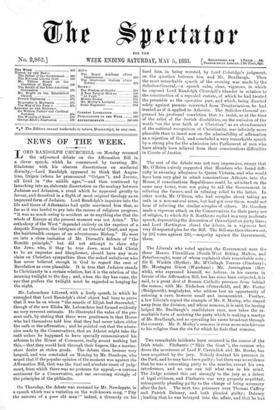Mr. Labonchere followed, with a lively speech, in which he
rema4ed that Lord Randolph's chief object had been to prove that iL was he on whom "the mantle of Elijah had descended," though of the new Elisha Mr. Labouchere had formed evidently no very reverent estimate. He illustrated the value of the pre- sent oath, by stating that there were gentlemen in that House who had themselves told him that they had never taken either the oath or the affirmation ; and he pointed out that the admis- sion made by the Conservatives, that an Atheist might take the oath unless he happened to have specially communicated his atheism to the House of Commons, really meant nothing but this,—that they would look through their fingers, like a marine. store dealer at stolen goods. The debate then became very languid, and was concluded on Monday by Mr. Stanhope, who urged that if the popular opinion of the moment was against the Affirmation Bill, that was the final and absolute court of judg- ment, from which there was no pretence for appeal,—a curious sentiment for a Conservative, and one savouring strongly of the principles of the plebiscite.


































